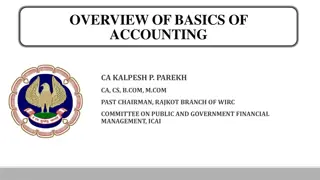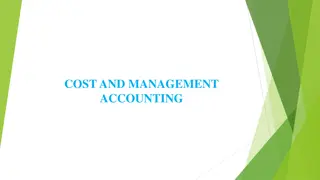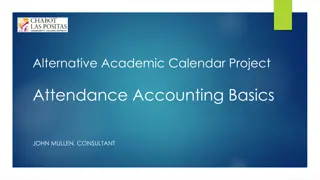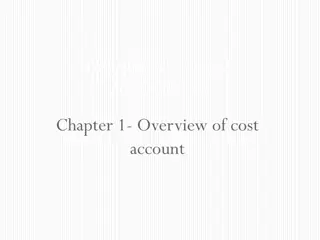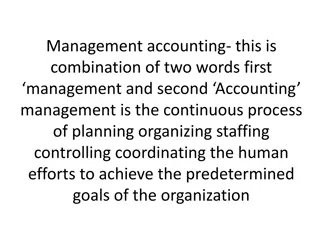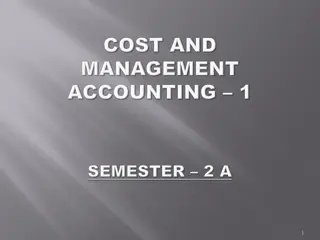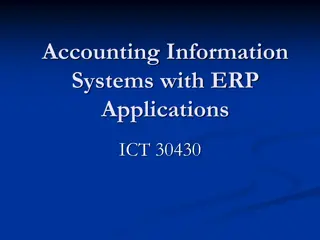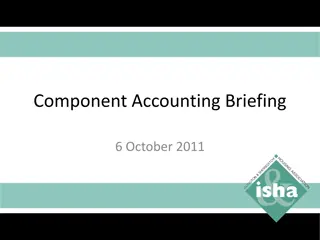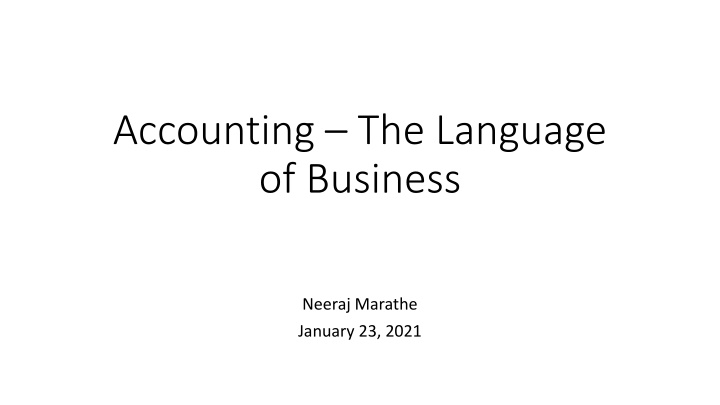
Understanding the Basics of Accounting and Bookkeeping
Explore the fundamentals of accounting, including the need for accounting, recording transactions, double-entry bookkeeping, and more. Gain insights into the essential aspects of financial statements, record keeping, and classification of accounts. Enhance your understanding of accounting principles with simple examples and practical guidance.
Download Presentation

Please find below an Image/Link to download the presentation.
The content on the website is provided AS IS for your information and personal use only. It may not be sold, licensed, or shared on other websites without obtaining consent from the author. If you encounter any issues during the download, it is possible that the publisher has removed the file from their server.
You are allowed to download the files provided on this website for personal or commercial use, subject to the condition that they are used lawfully. All files are the property of their respective owners.
The content on the website is provided AS IS for your information and personal use only. It may not be sold, licensed, or shared on other websites without obtaining consent from the author.
E N D
Presentation Transcript
Accounting The Language of Business Neeraj Marathe January 23, 2021
Why is accounting needed?! That means you are out of money. What did you spend so much money on? Hey Dad, missing you. How are you? How mean! But ya you are right. I spent it on, you know.. Stuff.
What is expected from you? As management professionals, this is what you will be concerned with the most Executive decision making But understanding how to get to this point is also most important Financial statement analysis If financial statements are messed up, further steps become immaterial. But you need to understand that in the first place! Prep of financial statements You need working knowledge of accounting, expert knowledge is optional Actual Accounting For those of you who plan of starting / joining their own business, however, a more in-depth knowledge of accounting is very important Record Keeping
What is accounting? Recording of various transactions of the business, based on certain rules Rules; you have to remember by-heart, all else is pretty logical It started with this; the single entry accounting system (Bahi-khata) However, it was not something scalable and cross-checks were not there So, the double entry accounting system was formulated Every transaction has 2 parts; you give something and you get something So it s pretty logical that every transaction must be given 2 effects in the books of accounts; one debit effect & one credit effect
The double entry book keeping system What you need to know: there are 3 types of accounts; personal, real and nominal. On what basis to classify them is part of theory All accounts can be classified into 4 broad categories; income, expenditure, asset and liability. You just have to understand what is what; again, a bit of theory and a bit of practice
Some simple examples It is all pretty mechanical, once you get a hang of it. Just be systematic and go step-by-step!
The accounting cycle The accounting cycle starts with a transaction and ends with preparation of the financial statements; P&L, balance sheet and cash-flow Essentially, the same thing is recycled and presented in different books in different ways to arrive at the final statements The main parts of the cycle are Transaction (The beginning) Journal (A book of account) Ledger (A book of account) Trial balance (Essentially, a summary) Final accounts (Financial statements) Let us see how
The accounting cycle A/Cs involved: Salary a/c Cash a/c Journal Particulars Salary a/c Dr To Cash a/c TRANSACTION Paid salaries in cash Rs.10000/- Amt Dr Amt Cr 10,000 10,000 (Being paid salary in cash) Same thing, just presented in different ways again and again! Cash Flow Statement
Why accounting matters The way you account for various items determines your profitability as well as assets/liabilities (P&L and Balance Sheet) You can significantly change both, by clever use of accounting Some examples Accounting Standards Let s say you are manufacturing pumps. When should you record something as sales ? You are an IT company and you bill in $. You sent your client a bill for $100. On the day of billing, $1 = 75. The client transferred $100 after 30 days. That time, $1 = 70. You have to report your revenue in . How much? How long does a treadmill/other gym equipment last? Rs.100, depreciated for 10 years = Rs.10 depreciation per year. But depreciated for 4 years?!
Ratio analysis Why ratio analysis? By merely observing financial statements, one cannot understand the performance of the enterprise The linkages and inter-connections become clear only after analysis and comparison Ratio analysis is a systematic use of ratios to interpret/assess the performance and status of the enterprise Ratios are meaningless without comparison
Ratio analysis Ratio analysis is therefore, a quantitative analysis of financial statements Ratios help us conduct inter-firm, intra-firm and industry comparison Ratios help us detect frauds/red flags Various readers of financial statements will give different importance to different ratios. Bankers, investors, company management Huge number of ratios Balance sheet ratios, P&L ratios, connecting ratios! Everyone will customize them to suit their own needs In some cases, the formula may also be different
Some examples and how they help Particulars Year 1 Year 2 Year 3 Year 4 Year 5 Year 6 Sales 100 120 150 130 130 120 Simple Profit Margin ratio Profit after tax 10 13.2 16.5 15.6 15.6 15.6 Margin 10% 11% 11% 12% 12% 13% Funda of Capital Employed and ROCE; PBIT (profit) Particulars Year 1 Year 2 Year 3 Year 4 Year 5 Year 6 ROCE tells you how efficiently you are using capital, which is a scarce resource Capital Employed 100 110 125 130 130 140 Profit 10 12.1 13.75 15.6 15.6 18.2 ROCE 10% 11% 11% 12% 12% 13%
Some examples and how they help Particulars Year 1 Year 2 Year 3 Year 4 Year 5 Year 6 Sales Rs 100 130 170 200 250 300 Profit Rs 10 15 18 24 30 38 Profit Margin % 10% 12% 11% 12% 12% 13% Debtors Rs 20 30 45 60 90 110 Days 73 84 97 110 131 134 Can anyone tell me what does debtors mean? Now what you say about this business?
Some actual stuff Asian Paints Rs.250000 cr Berger Paints Rs.16000 cr
To sum it all up Accounting, ratios and related topics are not hard, they just require effort and practice Do not have any mind-blocks; just be systematic These will be useful and practically applicable in real life; personally as well as professionally. It is not just useless theory What we have covered is maybe 1%! Some tips! Start maintaining an account of your own expenses; it helps understand the topic, plus you will feel guilty too If you are interested in reading and learning more about accounting, pick up books by Indian authors; accounting norms differ in different countries




